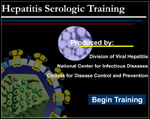Training Resources
CDC Training

Viral Hepatitis Serology Online Training: Hepatitis A–E
This online training is comprised of six animated tutorials with voiceovers
and eight case studies. The tutorials and case studies combine to teach
the course objectives.
Training access

Diagnosis and Management of Foodborne Illnesses
A Primer for Physicians and Other Health Care Professionals
Physicians and other healthcare professionals have a critical role in the prevention and control of food-related disease outbreaks. This primer is intended to provide practical and concise information on the diagnosis, treatment, and reporting of foodborne illnesses. It was developed collaboratively by the American Medical Association, the American Nurses Association-American Nurse Foundation, CDC, the Food and Drug Administration's Center for Food Safety and Nutrition, and the United States Department of Agriculture's Food Safety and Inspection Service.
External Training

Hepatitis Web Study
The University of Washington - Seattle Prevention Training Center was
funded by the Division of Viral Hepatitis to develop a website that offers
free CME/CNE credits. The interactive case studies cover a broad array
of topics related to prevention, management, and treatment of viral hepatitis.
Training access
![]()

Implementing Vaccine Preventable Hepatitis (VPH) Immunization Into Practice Across Specialties
Options for the prevention of hepatitis A and B have become available
through the identification of immunizations that have recently been elucidated
after years of research. Physicians must understand this research, including
findings regarding epidemiological trends and at-risk populations, in order
to initiate positive changes in immunization practices. Moreover, physicians
should be familiar with the benefits and liabilities associated with existing
immunization policies, consensus guidelines and clinical evidence, strategies
designed to close the gaps in immunization programs, and methods for overcoming
barriers to universal vaccination initiatives. The relevance of this information
must also be addressed with individual specialties—primary care, infectious
diseases, gastroenterology, and obstetrics/ gynecology—to emphasize the
broad applicability of preventative measures for vaccine-preventable hepatitis
(VPH).
Training access
![]()
Specialized Training
Epidemiology of HCV in the United States: The HepCAT Project
Page last modified: June 23, 2008
Content source: Division of Viral Hepatitis
